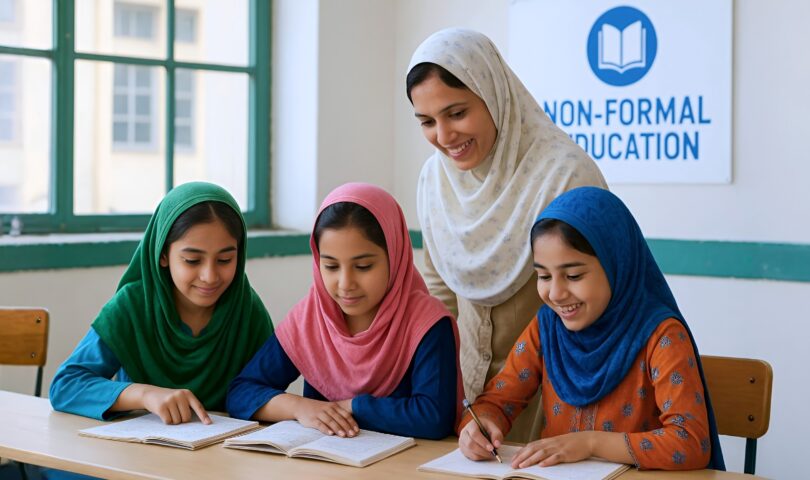The Pakistan Institute of Education (PIE) has published the 2023–24 National Non-Formal Education (NFE) Statistical Report, outlining recent progress and persisting challenges in the non-formal education sector. According to the report, there are now 35,427 non-formal education centers operating nationwide, serving over 1.29 million learners—a 20% increase in enrollment compared to the previous year.
One of the report’s key highlights is the continued rise in female participation. In 2023–24, girls accounted for 57% of total enrollments, reflecting steady progress toward gender parity. Women also make up 82% of the teaching workforce in the NFE system, demonstrating strong female engagement in both learning and leadership roles.
The report also reflects a growing focus on adult education. A total of 3,382 adult literacy centers are currently functional, reaching over 80,000 learners. Additionally, 10,181 refugee children, primarily from Afghanistan, are now enrolled in non-formal education programs. Innovative models like the Accelerated Learning Program (ALP) Middle-Tech are being introduced, blending academic and vocational skills to improve learning outcomes and student retention.
However, the report also points to significant regional disparities, particularly in rural and underserved areas. Data from the Pakistan Economic Survey reveals that female literacy remains far lower than male literacy—especially in rural Balochistan, where only 31% of women are literate. These gaps are reflected in global rankings as well: Pakistan is placed 164th out of 193 countries on the Human Development Index (HDI) and 144th out of 173 on the Human Capital Index (HCI), with education being a key contributing factor.
https://x.com/PIEPakistangov/status/1943279086807253134?t=jyav24zSrvlS_mzUPErewg&s=19
To address these challenges, the report recommends scaling up ALP programs, particularly the Middle-Tech model, which has shown a 70% completion rate. It also calls for increased investment in adult literacy, use of modern assessment tools like Recognition of Prior Learning (RPL), and targeted strategies to bridge gender and regional divides. Another priority is enhancing data collection and analysis to support informed, evidence-based policymaking.
The report also emphasizes the importance of NF-EMIS, a web-based Non-Formal Education Management Information System. This tool enables real-time data collection and integration from across all provinces, helping to improve transparency and strengthen policy decisions at both federal and provincial levels.
Non-formal education is described as a “second-chance model”—a flexible, community-based approach that is significantly more affordable than formal schooling. The monthly cost per child ranges from PKR 1,000 to 1,500, making it a viable option for low-income families and hard-to-reach communities.
PIE’s annual report reaffirms that non-formal education is emerging as a cost-effective and inclusive solution for addressing Pakistan’s educational challenges. Yet, low female literacy, regional inequalities, and a large out-of-school population continue to demand urgent and sustained action. The report outlines a detailed roadmap for strengthening the sector and building a more equitable education system for national development.
This progress is being driven through collaboration between public and private stakeholders. At the federal level, institutions such as the Federal Directorate of Education (FDE), National Education Foundation (NEF), Basic Education Community Schools (BECS), and Allama Iqbal Open University (AIOU) are playing key roles. In Punjab, the Punjab Education Foundation (PEF), PEIMA, and the School Education Department (South Punjab) are active contributors. In Sindh, the Sindh Education Foundation (SEF); in Balochistan, the Social Welfare Department; and in Khyber Pakhtunkhwa, the Elementary and Secondary Education Foundation (ESEF) are leading efforts. Numerous national and international NGOs and INGOs are also playing a vital role in expanding access to education across the country.
